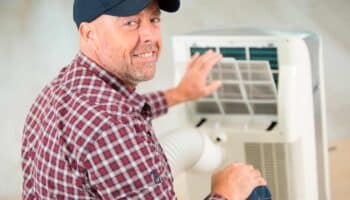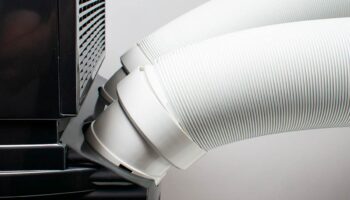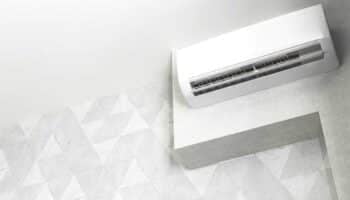Does your AC sound like splish, splash, it’s taking a bath?
In other words, are you hearing water sounds from your portable air conditioner and wondering what it means?
We have the answer!
First up, water sounds from your portable AC may be normal — all air conditioners create condensation as they pull humidity from the air . Your AC has a drip pan, and you may hear the sound of condensation splashing or dripping into it. However, a clogged drain plug or line will cause water to back up.
If Your Portable AC is Making Water Sounds…
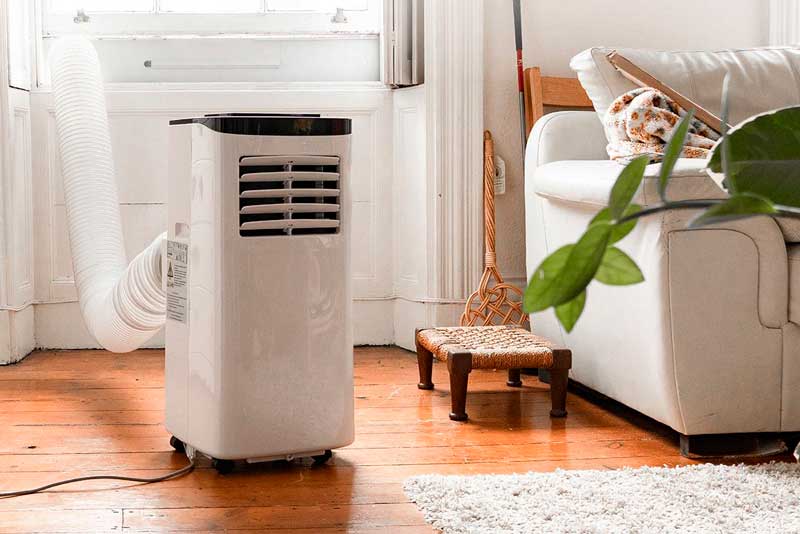
There’s a very strong possibility you have nothing to worry about. Let me explain.
All Air Conditioners Create Condensation (Water)
Portable air conditioners work by removing heat and moisture from the air in a room. As warm air is pulled into the air conditioner, it passes over a set of evaporator coils that are filled with cold refrigerant.
Heat in the air is absorbed by the refrigerant, which causes it to evaporate into a gas. The cooled air is then blown back into the room, while the warm refrigerant gas is sent outside.
However, as the air cools, the moisture in the air condenses on the evaporator coils and collects in a small reservoir or tray located at the bottom of the unit. This is because cold air can’t hold as much moisture as warm air, so as the air is cooled, the excess moisture in the air forms water droplets.
The water collected in the reservoir needs to be emptied periodically, usually by manually removing the tray and pouring out the water. Additionally, many newer models remove moisture by means of self-evaporation.
As warm air is expelled through the exhaust vent it takes the condensate with it, which can be convenient for continuous use without interruption.
So those water sounds you’re hearing could just be the condensate making its journey to the reservoir, and it’s perfectly normal!
But… it could be something else.
Check for Clogged Drain Lines or Plugs
Want to see how water travels in your portable AC? Take a look at this video. The owner of this air conditioner is looking for the cause of a leak, but the video does provide you with an excellent visual of how water travels through the unit and eventually drains.
Step 1
Unplug your air conditioner.
Step 2
Take it apart following the manufacturer’s guidelines. If you do not have your owner’s manual, you can typically find and download manuals from the manufacturer’s website.
Step 3
Check for standing water anywhere in the unit—refer to the video.
Step 4
If your drain pan or reservoirs are full, empty them and clean them.
Step 5
If you have a drain hose, disconnect it and test to see if water runs through it freely. If not, try using a bottle brush to dislodge any sediment, or even try using compressed air. Reattach the hose.
Step 6
Check for any blockages in the drain plug. Remove and clean if necessary.
Water May be Hitting the Fan
It’s never any fun when it hits the fan, right?
Referring again to the video above, sometimes water travels in places it shouldn’t. If you do have an obstruction of some type in your drain hose or plug, water may be trickling throughout the unit. That in itself will create a sound, but if water encounters the fan and gets slapped around by the blades, it will make additional sounds.
Follow the steps above to check and fix any water drainage problems.
Overcharged Air Conditioner
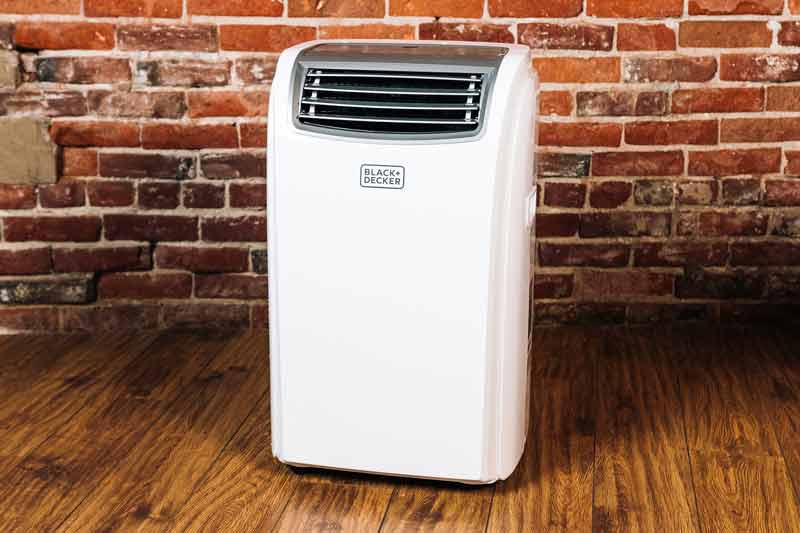
An overcharged air conditioner refers to an air conditioner that has too much refrigerant in the lines. In this scenario, a pressure imbalance is created which can lead to gurgling or bubbling sounds.
However, if your air conditioner is overcharged, you probably have some other symptoms as well. If you can hear the gurgling sounds along with any of the following, you’ll need a professional to look at the unit. Only certified professionals should handle refrigerant.
Here are some symptoms of an overcharged air conditioner.
Unusually high operating costs. Air conditions are designed to use a specified amount of refrigerant, and it won’t work properly if those levels are exceeded. In order to complete the process of absorbing heat, the refrigerant needs to be gaseous, but when levels are exceeded, it remains liquid — thus the gurgling and burbling sound.
If this is happening, efficiency is impacted and the cost of operation goes up.
Higher than normal humidity. In some cases, too much refrigerant can increase humidity levels. This is again due to the refrigerant remaining liquid, as mentioned above. If this happens it can’t absorb heat so the evaporator coil is hotter than it should be.
A hotter than normal evaporator coil means that water vapor won’t condense on it, you’ll just create humidity in your home instead.
Increased condenser heat. Your portable air conditioner has a condenser housed inside and all condensers give off heat — its job is to get rid of the heat that the refrigerant absorbs. But if your system is overcharged, your condenser could give off more than normal heat.
Your air conditioner stops working. Eventually, there’s a good chance that your air conditioner’s compressor motor will burn out if you have an overcharged system.
If you suspect that there is anything wrong with the refrigerant in your air conditioner, contact an HVAC professional.
Conclusion
The good news is, it’s very likely that the water sounds you’re hearing are perfectly normal. All air conditioners produce condensate — water — and that water travels through the unit.
However, it’s also possible that the sound may be an indication of a problem. To recap, it could be one of the following:
- You may have a clogged drain line or plug
- Water may be hitting the fan
- You could have an overcharged air conditioner — too much refrigerant
If you do have a refrigerant issue, this is not something that you should try to repair on your own. Please call a professional.
Hopefully, the above information has helped you source and fix your problem. While you’re here, why not check out our related posts below? Perhaps we can help you with something else.





